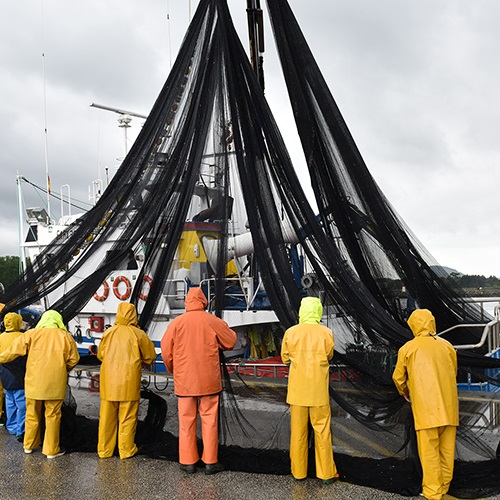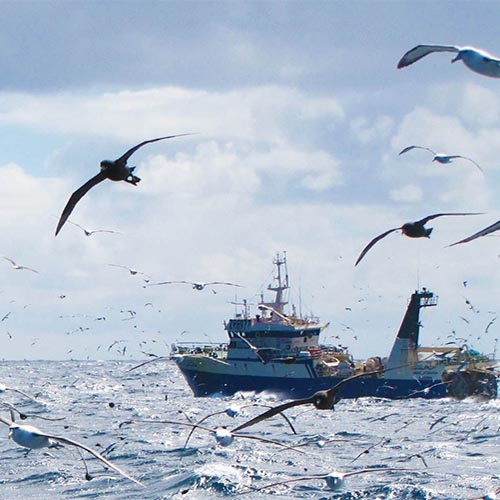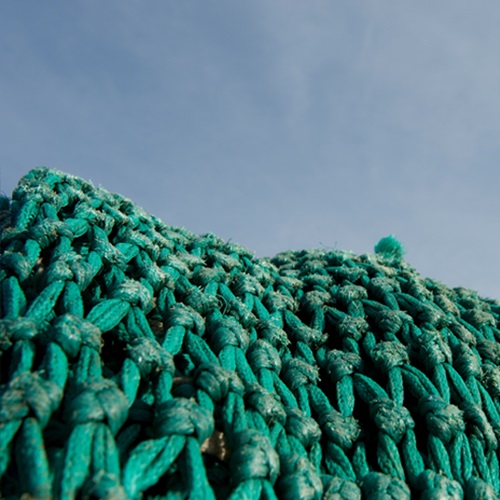The collection of high-quality data on fishing activities, recorded at sea, is a key part of effective fisheries management.
Data on fishing activity is provided by fishers on board the vessel and independent sources, such as third-party human observers and electronic monitoring equipment. Both sources of data are essential in enabling fishery managers to assess factors such as the catch and effort of the fishery, the health of the target species and the fishery's environmental impact.
When fisheries are assessed for MSC certification, independent auditors called Conformity Assessment Bodies take into consideration the quality and the range of the data captured by the fishery. The assessors judge whether the data is good enough to support effective management of the fishery and ensure it is sustainable. Some of the data provided is also used to assess the impact of a fishery in assessment.
What are at-sea monitoring programmes?
Many fisheries management authorities and Regional Fisheries Management Organizations (RFMOs) require fisheries to use at-sea monitoring programmes. These are considered necessary to provide accurate data on catch and effort, interactions with vulnerable species and the impact of the fishery on the environment. This helps fishery managers establish the status of fish stocks and set sustainable fishing limits.
At-sea monitoring programmes can include the installation of video cameras on vessels and use of GPS technology to track the location of fishing activity, in addition to the presence of human observers on fishing trips. The data collected through these methods is used alongside traditional monitoring methods such as fishers’ logbooks, at-sea inspections, surveillance patrols and dockside monitoring of landings.
What do fisheries observers do?
Fisheries observers are independent specialists who are deployed on board commercial fisheries vessels as part of at-sea monitoring programs. Observers are usually employed by governments or third-party contractors and levels of observer coverage are set by national government management agencies or RFMOs.
Observers collect data that is essential for the management of fisheries, such as logging the daily fishing catch, measuring samples of fish, and recording by-catch violations. They also collect detailed data required for scientific research. The information provided by observers can be used to validate and enhance data provided by the fishery and from other independent sources such as electronic monitoring.
Data from observer reports can be used to make sure that fisheries are complying with local, national and international laws. In some situations, observer data can also help to confirm a fishery’s compliance with certification standards, such as the MSC Fisheries Standard.
To ensure confidence in the data collected by observers, management authorities ensure that observers receive training, are rotated on different vessels and that intimidation of observers can be reported anonymously. Authorities also ensure that data collected by observers is secure, and may carry out random data spot checks and dock-side validation of log-books.
How are fisheries observers protected?
Fishing vessels can be dangerous workplaces and observers may find themselves in unsafe conditions with limited options for rescue or medical support. They may also come into conflict with the crew and are at risk of bribery, intimidation and harassment.
The MSC Fisheries Standard is an environmental sustainability scheme and does not include specific human rights requirements. Tougher action by RFMOs, as well as the rigorous application of national laws on human rights to combat violence and intimidation, is the best way to safeguard observers.
We recognise that human rights at sea, for both crews and observers, is an important issue and are engaged with organizations working to develop social requirements for fisheries. To improve the safety and welfare of fisheries observers, we have committed £100,000 for innovative research as part of our 2021 Ocean Stewardship Fund. We have also introduced policies to mitigate egregious labour practices on vessels operating in MSC certified fisheries and in MSC Chain of Custody certified supply chains.
What are the MSC requirements for monitoring, surveillance and observer coverage?
The MSC Fisheries Standard requires that certified fisheries collect a range of data, at a sufficient level of quality to support effective fisheries management. However, the Standard does not explicitly state how this must be achieved or set levels of observer coverage for specific vessels or activities.
To ensure that assessors are applying the MSC Fisheries Standard accurately and consistently, we set thresholds for the amount and quality of the data collected. Assessors are also required to consider if the method of data collection in place – whether this involves observers or electronic monitoring - is appropriate. This is assessed on a case-by-case basis and guided by widely accepted best practice for a particular fishery or fishing sector. This flexibility allows the Standard to incentivise high levels of observer coverage where it is needed, while remaining accessible for those fisheries where lower levels of observer coverage, or even alternative data collection methods, are appropriate.
For critical issues relating to shark finning and bycatch we provide guidance that includes observer coverage. In these circumstances, assessors must provide a good reason for not following the guidance in an assessment.
Improving our standards
Every few years we review the MSC Standards so they continue to reflect globally adopted best practice. This allows us to incorporate widely accepted new science and fisheries management best practice, as well as improve implementation and address stakeholder concerns.
Find out how the Fisheries Standard Review aims to update our best practice requirements for monitoring, control and surveillance and ensure that effective fisheries management systems are in place.
Stakeholders from all sectors are at the heart of our review, helping identify issues, develop solutions and test proposed changes.



